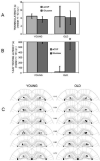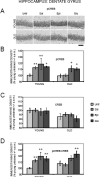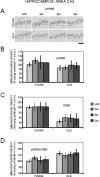Epinephrine and glucose modulate training-related CREB phosphorylation in old rats: relationships to age-related memory impairments
- PMID: 23201424
- PMCID: PMC3557608
- DOI: 10.1016/j.exger.2012.11.010
Epinephrine and glucose modulate training-related CREB phosphorylation in old rats: relationships to age-related memory impairments
Abstract
Epinephrine enhances memory in young adult rats, in part, by increasing blood glucose levels needed to modulate memory. In old rats, epinephrine is deficient at raising blood glucose levels and thus is only moderately effective at enhancing memory. In contrast, systemic glucose injections improve memory in old rats, with resulting memory performance equal to that of young rats. The diminished response of glucose to training in old rats may blunt downstream neurochemical and molecular mechanisms needed to upregulate memory processes. In the first experiment, young adult and old rats were trained on an inhibitory avoidance task with immediate post-training injections of aCSF or glucose into the dorsal hippocampus. Old rats had significant memory impairments compared to young rats 7 days after training. Intrahippocampal injections of glucose reversed age-related deficits, improving memory scores in old rats to values seen in young rats. A second experiment examined age-related changes in activation of the transcription factor CREB, which is widely implicated in memory formation and may act downstream of hormonal and metabolic signals. Activation was assessed in response to training with systemic injections of epinephrine and glucose at doses known to enhance memory. Young adult and old rats were trained on inhibitory avoidance with immediate post-training systemic injections of saline, epinephrine, or glucose. After training, old rats had significant impairments in CREB phosphorylation in area CA1 and the dentate gyrus region of the hippocampus, and in the basolateral and lateral amygdala. Epinephrine and glucose attenuated age-related deficits in CREB phosphorylation, but were more effective in the amygdala and hippocampus, respectively. Together, these results support the view that age-related changes in blood glucose responses to epinephrine contribute to memory impairments, which may be related to alterations in regional patterns of CREB phosphorylation.
Copyright © 2012 Elsevier Inc. All rights reserved.
Figures





References
-
- Aguiar AS, Jr., Castro AA, Moreira EL, Glaser V, Santos AR, Tasca CI, Latini A, Prediger RD. Short bouts of mild-intensity physical exercise improve spatial learning and memory in aging rats: involvement of hippocampal plasticity via AKT, CREB and BDNF signaling. Mech. Ageing Dev. 2011;132:560–567. - PubMed
-
- Assunção M, Santos-Marques MJ, Carvalho F, Andrade JP. Green tea averts age-dependent decline of hippocampal signaling systems related to antioxidant defenses and survival. Free Radic. Biol. Med. 2010;48:831–838. - PubMed
-
- Barnes CA. Memory changes with age: neurobiological correlates. In: Martinez JL, Kesner RP, editors. Learning and Memory: A Biological View. Academic Press; New York: 1991. pp. 259–296.
-
- Barros DM, Izquierdo LA, Sant'Anna MK, Quevedo J, Medina JH, McGaugh JL, Izquierdo I. Stimulators of the cAMP cascade reverse amnesia induced by intra-amygdala but not intrahippocampal KN-62 administration. Neurobiol. Learn. Mem. 1999;71:94–103. - PubMed
Publication types
MeSH terms
Substances
Grants and funding
LinkOut - more resources
Full Text Sources
Other Literature Sources
Medical
Miscellaneous

